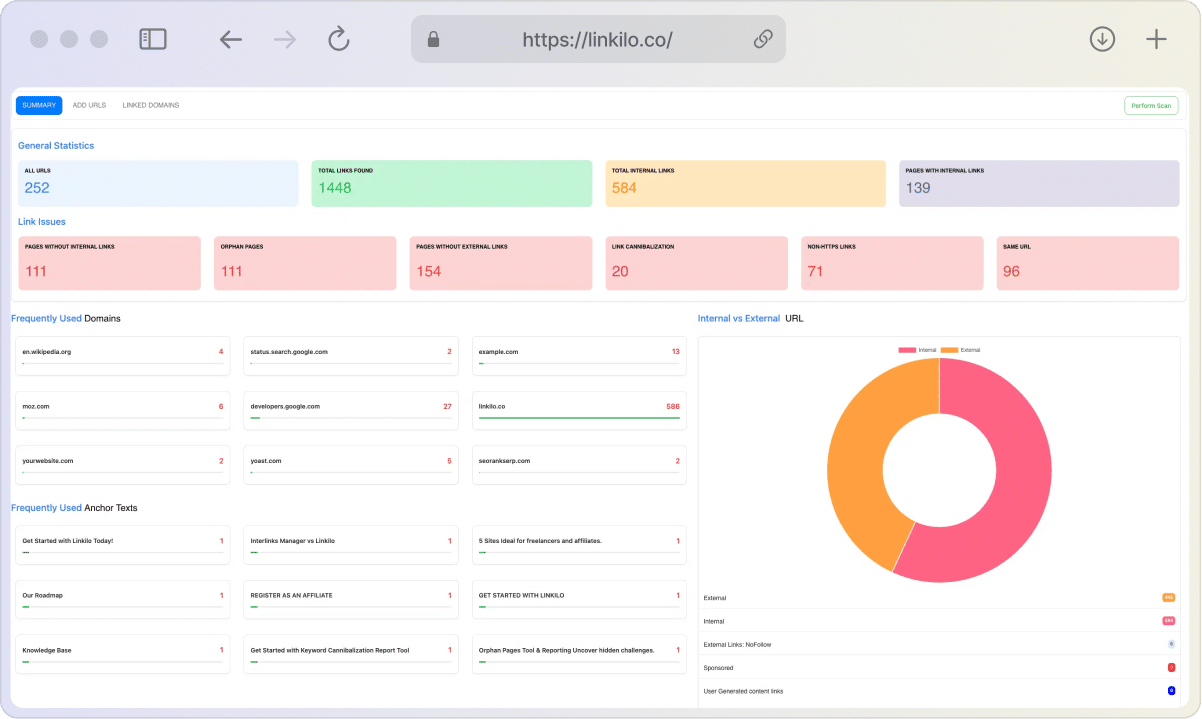Where competition is fierce and visibility is a challenge, using the best free SEO tools can often be a game-changer. Google, being the search engine giant, offers a suite of SEO tools designed to enhance your online visibility.
In this article, we dive into 14 Google SEO tools, shedding light on how to utilize them to sharpen your SEO strategy and stay ahead in the digital game.
Now, let’s dive into the treasure trove of Google’s SEO tools.
1. Use Google SERP for SEO Insights

- What: Google’s very own search engine is a goldmine for SEO insights. It’s not just a tool for finding information but a resource for discovering what your target audience is searching for.
- Why: Understanding common queries helps in tailoring content that resonates with your audience, ultimately driving more organic traffic to your site.
- How:
- Auto-Suggest Feature: As you begin typing a keyword in the search bar, Google provides suggestions based on what others are searching for. This feature helps in uncovering long-tail keyword variations.
- People Also Ask Section: This section unveils related questions that individuals are asking, providing a wealth of ideas for content creation.
- Competitor Analysis: By analyzing the top-ranking pages for specific keywords, you can understand what content the algorithm deems valuable and how you can optimize your content to compete.
- Example: Suppose you run a vegan bakery. Typing “vegan bakery” in Google’s search bar might suggest related searches like “vegan bakery near me” or “vegan bakery gluten-free”, which can inspire new content or products.
2. Google Search Console: Your SEO Performance Dashboard

- What: Google Search Console (GSC) is a free tool provided by Google that helps you monitor, maintain, and troubleshoot your site’s presence in Google Search results.
- Why: It’s essential for understanding how Google views your site, identifying technical SEO issues, and optimizing your site for better search visibility.
- How:
- Performance Analysis: GSC provides data on the number of clicks, impressions, click-through rate (CTR), and the average positions of your keywords.
- Identify and Fix Crawl Errors: Discover and rectify crawl errors to ensure Google can accurately index your site.
- Sitemaps Submission: Submit sitemaps to help Google understand the structure of your site and find new pages faster.
- Example: If you notice a decline in organic traffic, GSC can help identify potential issues such as crawl errors or a drop in rankings for specific keywords, enabling you to take corrective actions.
3. Google Keyword Planner: Identify Keyword Opportunities

- What: Initially designed for AdWords campaigns, Google Keyword Planner is now a robust free keyword research tool.
- Why: Finding the right keywords is foundational to SEO success, and this tool provides insights into keyword ideas, search volumes, and competition (alternative to keyword difficulty).
- How:
- Keyword Discovery: Enter a seed keyword to generate a list of related keywords along with their search volume and competition levels.
- Keyword Trends: Understand seasonal trends for specific keywords to time your content optimally.
- Example: If you sell winter coats, using Google Keyword Planner can help identify related keywords and their search volume spikes during colder months, aiding in planning your content and inventory.
4. Google Trends: Keeping a Pulse on What’s Hot

- What: Google Trends is a tool that shows how frequently a given search term is entered into Google’s search engine relative to the site’s total search volume over a given period.
- Why: It helps in identifying trending topics, which can be leveraged to create relevant and timely content.
- How:
- Discover Trending Topics: Look for rising topics in your niche and craft content around them.
- Compare Keywords: Compare different keywords to see which are gaining traction.
- Example: If you’re in the fitness industry, monitoring trends can help you catch onto emerging workout crazes or health topics, allowing you to create content that captures the moment.
5. Site Kit by Google: Centralizing Google Tools on WordPress

- What: Site Kit is a WordPress SEO plugin that consolidates various Google tools into one dashboard within your WordPress interface.
- Why: It simplifies the process of accessing and analyzing data from various Google platforms, saving time and effort.
- How:
- Easy Setup: With a simple setup process, you can have all Google tools like Analytics, Search Console, and AdSense centralized.
- Performance Monitoring: Track your site’s performance directly from your WordPress dashboard.
- Example: If you run a small online store on WordPress, Site Kit can help you monitor your site’s traffic, check on ad revenue, and analyze user behavior all in one place, making it a powerful tool for decision-making.
6. Google Tag Manager: Streamlining Tag Management

- What: Google Tag Manager (GTM) is a tool that allows you to manage and deploy marketing tags (snippets of code or tracking pixels) on your website (or mobile app) without having to modify the code.
- Why: It’s a lifesaver for marketers who have little to no coding knowledge, allowing for swift deployment and management of tags.
- How:
- Tag Deployment: Easily add and update tags for conversion tracking, site analytics, and more without the need to edit the site code.
- Improved Site Speed: By reducing the amount of code needed on your site, GTM can enhance your site’s loading speed, which is crucial for SEO.
- Example: For an e-commerce site, tracking various metrics and user interactions is crucial. GTM allows you to manage various tags like Facebook Pixel, Google Analytics code, and AdWords conversion tracking effortlessly.
7. Google Alerts: Your Brand’s Digital Watchdog

- What: Google Alerts is a tool that allows you to monitor the web for new mentions of specified keywords.
- Why: It’s vital for brand management, reputation monitoring, and staying updated on industry developments.
- How:
- Setting Up Alerts: Create alerts for your brand name, products, or industry keywords to receive updates straight to your inbox.
- Monitoring Brand Mentions: Stay on top of where and how your brand is being mentioned to manage your online reputation effectively.
- Identifying Link Building Opportunities: Spot mentions that aren’t linked back to your site and reach out for link attribution.
- Example: Suppose you own a coffee shop, setting up alerts for “best coffee in town” can help you track local competition and customer reviews, enabling you to respond timely or adjust your marketing strategy.
8. Google Lighthouse: Lighting the Way to Page Optimization

- What: Google Lighthouse is an open-source, automated tool for improving the quality of web pages.
- Why: It provides a comprehensive look at various factors that impact your site’s performance, accessibility, and user experience.
- How:
- Performance Auditing: Run audits to identify issues like slow loading times or large files that might be hindering your site’s performance.
- SEO Assessment: Get insights into on-page SEO factors and how you can optimize them.
- Accessibility Checks: Ensure your site is accessible to all users by following the recommendations provided.
- Example: If your online store’s pages are loading slowly, Google Lighthouse can pinpoint the exact issues, like unoptimized images or render-blocking JavaScript, and provide actionable recommendations to enhance page load speed.
9. Google Mobile-Friendly Test: Tailoring Sites for Mobile Users

- What: This tool evaluates how well your site is optimized for mobile viewing.
- Why: With mobile internet usage surpassing desktop, ensuring your site is mobile-friendly is crucial for user satisfaction and SEO.
- How:
- Mobile Compatibility Testing: Discover how well your site performs on mobile devices and get recommendations for improvement.
- Viewport Configuration: Ensure your site’s viewport is correctly configured to provide an optimal viewing experience across different devices.
- Example: A local bakery might find that their site’s text is too small to read on mobile devices, prompting a necessary adjustment to improve mobile user experience and retain potential customers.
10. Rich Results Test: Unlocking Enhanced SERP Features

- What: The Rich Results Test tool checks the code of your web pages to see if they are eligible for rich results – enhanced snippets that appear in search results.
- Why: Rich results can significantly enhance visibility and click-through rates in SERPs.
- How:
- Structured Data Validation: Ensure your structured data is correctly implemented to qualify for rich results like reviews, recipes, or product information.
- Error Identification: Discover and fix any errors in your structured data to improve your chances of achieving rich results.
- Example: An online cookbook site can use this tool to ensure their recipe pages are eligible for rich results, making them stand out in SERPs and attract more traffic.
11. PageSpeed Insights: Speeding Up Success

- What: PageSpeed Insights analyzes the content of a web page, then generates suggestions to make that page faster.
- Why: Page speed is a critical factor in user satisfaction and SEO, impacting bounce rates and conversions.
- How:
- Performance Scoring: Get a clear score on your site’s loading speed on both mobile and desktop.
- Optimization Recommendations: Receive detailed recommendations to improve site speed like image optimization, code minification, and browser caching.
- Example: An online magazine could use the tool to identify and fix slow-loading pages, improving user experience and potentially boosting ad revenue.
12. Google Data Studio (now Looker Studio): Visualizing Data

- What: Google Data Studio, now called Looker turns your data into informative, easy-to-read, and shareable dashboards and reports.
- Why: It’s crucial for making data-driven decisions and simplifying data analysis.
- How:
- Custom Dashboards: Create custom dashboards to monitor various metrics important to your business.
- Data Integration: Pull data from various sources like Google Analytics, Google Ads, and more for a holistic view.
- Example: A digital marketing agency can use Google Data Studio to create client-friendly reports showcasing campaign performance in an engaging and understandable manner.
13. Google Analytics: The Traffic Encyclopedia

- What: Google Analytics is a comprehensive platform that provides detailed statistics and analytics of web traffic and is an essential tool for marketing.
- Why: Understanding your site’s traffic dynamics is fundamental to optimizing performance and achieving your business goals.
- How:
- Traffic Analysis: Analyze where your traffic is coming from, what pages are most visited, and where visitors are dropping off.
- Behavior Flow: Understand the path users take through your site and where you can optimize for better engagement.
- Example: An e-commerce site can track the user journey to identify at what point potential customers are abandoning their carts, and then take measures to improve the checkout process.
14. Google My Business: Nurturing Local SEO

- What: Now known as Google Business Profile, this tool helps manage your online presence across Google, including Search and Maps.
- Why: For local businesses, having a robust online presence is essential for attracting local customers.
- How:
- Profile Management: Keep your business information updated, respond to reviews, and post updates to engage with your local audience.
- Insight Analysis: Gain insights into how customers are interacting with your business profile on Google.
- Example: A local diner can use Google My Business to post daily specials, respond to reviews, and provide updated operating hours, enhancing their online visibility and engagement with local customers.
Frequently Asked Questions
1. Are Google’s SEO tools free to use?
Yes, the majority of Google’s SEO tools like Google Search Console, Google Analytics, and others are free to use. However, certain features or data might require a Google Ads account or other paid Google services.
2. How do Google SEO tools compare to other tools like SEMrush or Ahrefs?
Google’s SEO tools provide a solid foundation for understanding your website’s performance and identifying areas for improvement. However, tools like SEMrush or Ahrefs offer more advanced features like competitor analysis, backlink analysis, and more detailed keyword research.
3. Do I need to use all the Google SEO tools listed in this article?
Not necessarily. The choice of tools depends on your specific needs, goals, and the level of detail you require for your SEO strategies. It’s advisable to explore each tool to understand its capabilities and how it can benefit your SEO efforts.
4. How do I start using Google’s SEO tools?
Most of Google’s SEO tools require you to have a Google account. Once you have an account, you can sign up for each tool, and follow the respective setup processes which usually include verifying ownership of your website.
5. Can I use Google’s SEO tools if I am a beginner in SEO?
Absolutely! Google’s SEO tools are user-friendly and come with extensive documentation to help beginners understand the basics of SEO and how to use the tools to improve their website’s performance.
6. How often should I check these tools for my website’s SEO performance?
The frequency depends on your individual circumstances such as the size of your website, the volume of traffic you receive, and your overall SEO strategy. However, a general recommendation is to check these tools at least weekly to keep a pulse on your website’s performance and to identify any potential issues early on.
7. Will using Google’s SEO tools guarantee higher rankings on Google?
While these tools provide valuable insights and help in optimizing your website, there’s no guarantee of achieving higher rankings as Google’s search algorithm considers many factors. Consistent optimization and adhering to SEO best practices is key to improving your chances of ranking higher.
8. Can I track my competitors with Google’s SEO tools?
While Google’s SEO tools provide some insights, they are not as robust for competitor analysis as some other tools like SEMrush or Ahrefs. For detailed competitor analysis, you might want to consider investing in other SEO tools.
9. How can I learn more about using these Google SEO tools effectively?
Google provides extensive documentation and tutorials for its tools. Additionally, there are numerous online courses, forums, and communities dedicated to SEO where you can learn and interact with other SEO professionals.
10. Is there a Google SEO tool for managing local business listings?
Yes, Google My Business, now known as Google Business Profile, is a tool designed for managing your business’s online presence across Google, including Search and Maps, making it essential for local SEO.




